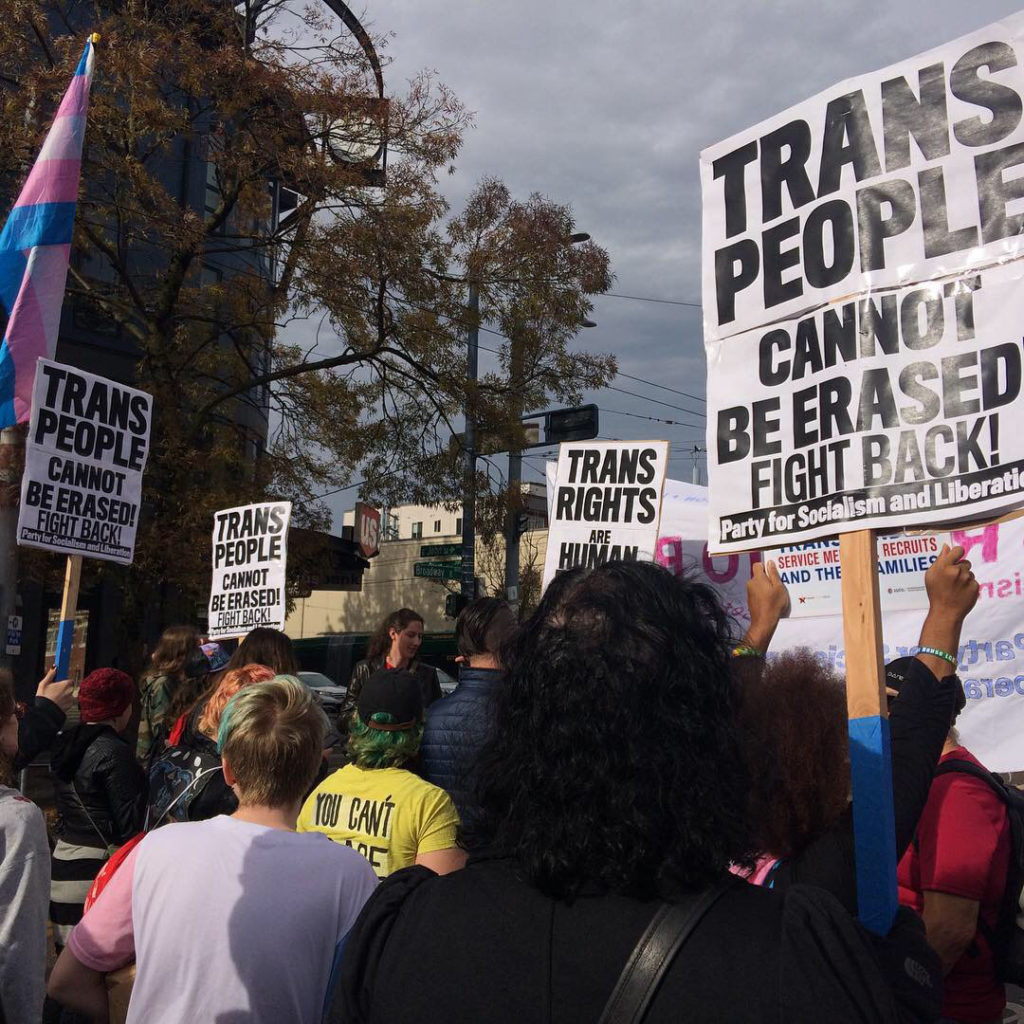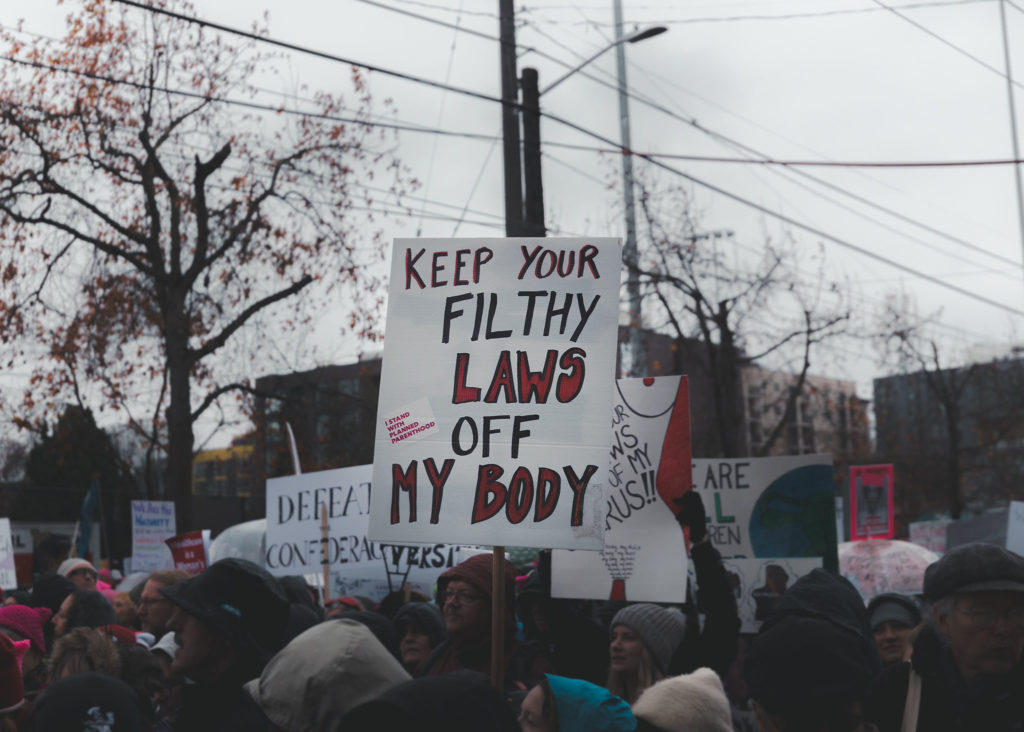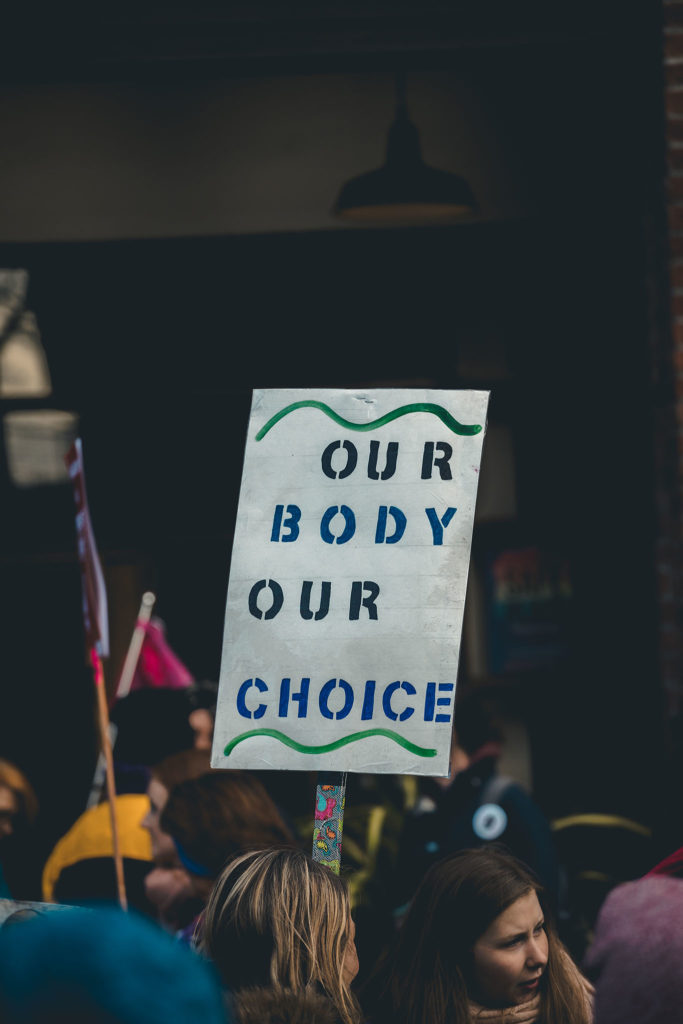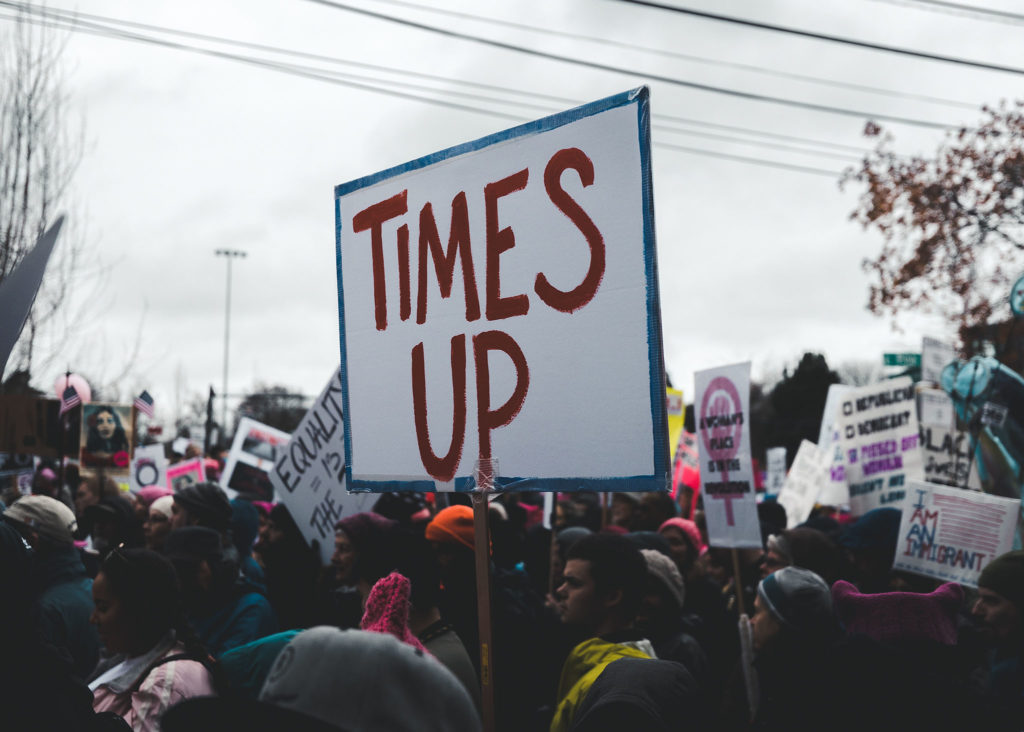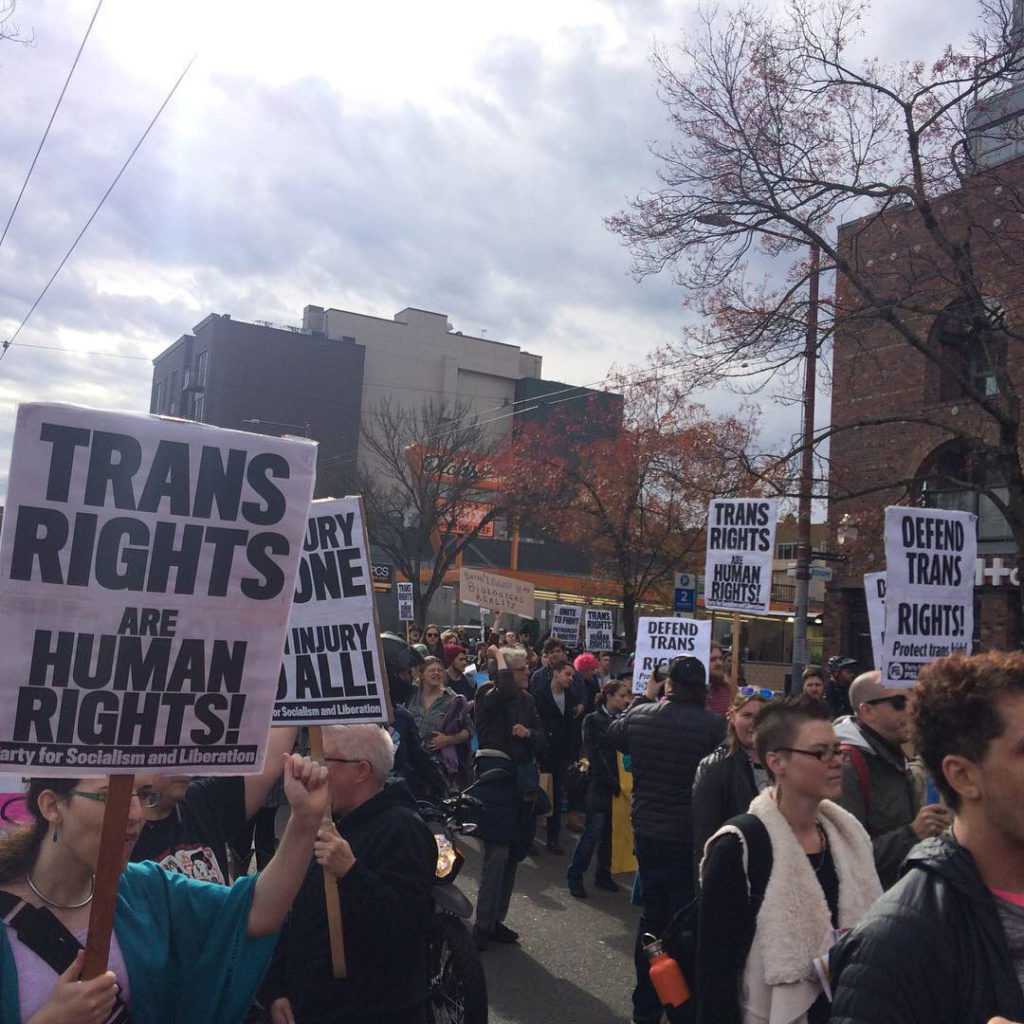“The last email that we got from the President was a reminder about homecoming, so I think it’s clear to see that the rights of transgender folks and protections and respect for transgender identities on this campus is not a priority for the administration.”
These are the words of Ames Zocchi, a student who co-led the event Trans* on Campus: A Discussion on Nov. 2, along with student Dev McCauley.
The two trans students, Zocchi and McCauley, are among those at Seattle University who feel there has been an inadequate response by university administration in the face of an increasingly hostile time for trans people in the United States.
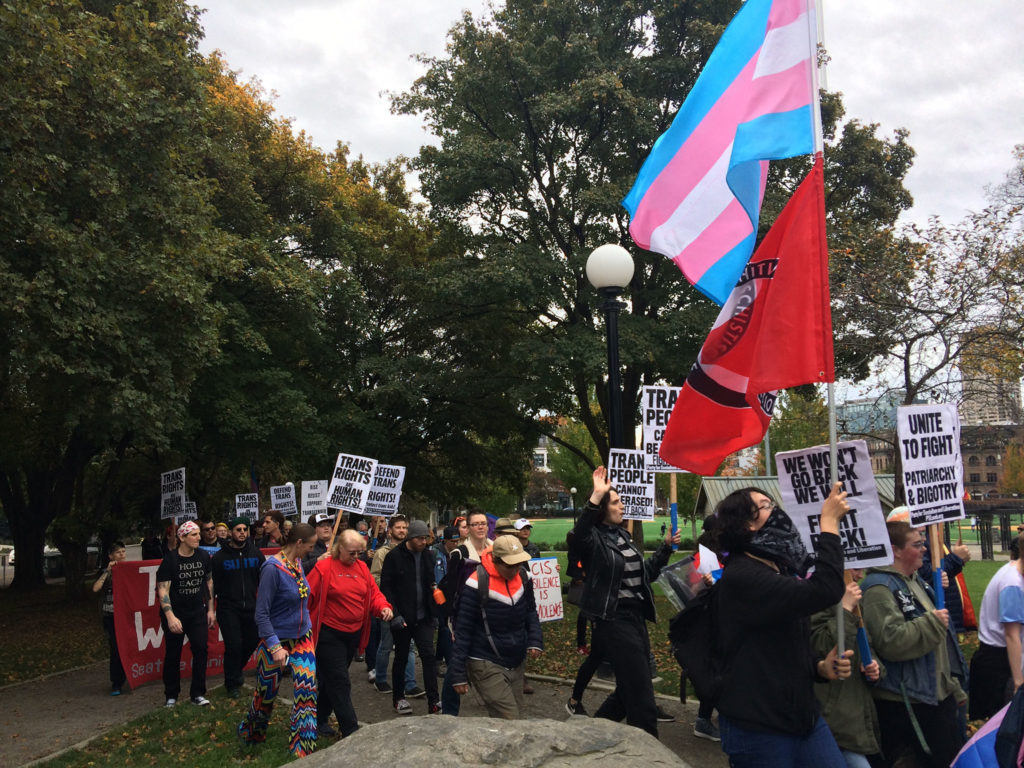
In response to the Trump administration’s memo on gender, the Party for Socialism and Liberation Seattle led a march in support of transgender rights on October 29 through Capitol Hill.
On Oct. 21, the New York Times published an article regarding a memo from the United States Department of Health and Human Services, which stated that the department wishes to permanently define sex as either male or female based on sexual organs at birth.
While the memo has yet to result in any formal changes, it would reverse various changes made by former President Barack Obama and his administration if enacted. The Obama administration took steps to allow people to define gender for themselves, specifically in regards to healthcare and education.
The implications of the memo could have life-altering effects for many at Seattle U, as Associate Professor of Law, Bryan Adamson explained.
“Yes it’s retrogressive, yes it is openly hostile, yes it threatens not only the status of trans individuals but the treatment they will receive in public spaces and public life, access to housing, access to employment, healthcare, the whole nine,” Adamson said. “But as a political matter, people should not be surprised. Unfortunately, people should not be surprised that this is one of the eventualities of this administration.”
This is not the first time the Trump administration has attempted to roll back Obama-era policies regarding gender identity.
In 2017, the Trump administration issued a directive in opposition to an Obama administration directive that sought to allow trans students to self-select the restroom that fit their gender identity in public schools. Neither of these directives have had any legal impact as the Obama adminstration’s directive was legally challenged by 13 states and never implemented, and the Trump directive faces its own legal challenges.
The Trump administration additionally began a thus far failed attempt to ban transgender individuals from serving in the U.S. military. The ban has undergone several iterations and legal challenges in response, leaving it currently unenforced.
On Oct. 25, President Fr. Stephen Sundborg S.J. spoke out against the Department of Health and Human Services memo at his quarterly President’s Forum. However, as an event that many members of the Seattle U community do not attend, his statement was not entirely heard around campus. Of the students and faculty interviewed by The Spectator, none were aware of these comments.
David Powers, Dean of Seattle U’s College of Arts and Sciences, is the sole member of Seattle U administration and the only college dean who has issued a statement regarding the Trump administration memo.
The college-wide email sent Oct. 25 specifically addressed the Trump administrations memo, stating: “I write to express support for all of our transgender and non-binary students, staff, and faculty.” The email also included links to resources on the Seattle U campus.
Additionally, Student Government of Seattle University (SGSU) Executive Vice President Jess Juanich sent a campus-wide email Oct. 31 on behalf of SGSU, the Gender Justice Center, Triangle Club, and the Queer and Trans People of Color organizations.
The statement reaffirmed the groups’ support for the trans community on campus and acknowledged that the university is “richer and stronger because of the gifts and the presence of SU’s transgender and gender non-conforming community.”
In an interview conducted Nov. 5, Sundborg acknowledged that the university should put forward a campus-wide statement; however, he said that he needed to consult with the newly formed LGBTQ+ task force in order to give an appropriate response.
“It does need to be clear that our university supports our transgender students and that we’re committed to that, and we’re committed to that by policy, and that we’re going to be engaged in conversations and learning in whatever way we need to do in order to be helpful and supportive of them,” Sundborg said. “So there should be a response, but I think that it would be informed by the LGBTQ task force.”
Approximately three hours after the Nov. 5 interview, the Seattle U community received an email from the Seattle U news account with the subject line “In Case You Missed It: In Support of Transgender Students” and a link to Sundborg’s comments made at the President’s Forum. The report of his remarks was posted Nov. 2.
The LGBTQ task force was formed in wake of comments made by Sundborg and the actions of Fr. David Leigh, S.J. last spring.
Leigh, a professor in the Seattle U English department and a prominent Jesuit on campus, removed entire stacks of The Spectator from stands, in a statement saying he was, “offended by a recent edition of The Spectator, whose cover contained what I considered an inappropriate risqué photograph.”
The cover photo in that week’s Spectator depicted a performer at Seattle U’s annual on-campus, school-sanctioned drag show.
He stated he had primarily removed them due to the arrival of new students and their families for Accepted Students Decision Day.
In response, Sundborg stated, among other things, he was “very, very embarrassed and ashamed” by the cover. He went on to call it “indecent” and said, “I thought it offended all dignity and respect of sexuality and of persons of bodies. I think it was a mistake on the part of the editorial staff to put that on the cover. I was offended by it… Anybody who would see that who has a sense of propriety would find that offensive.”
Both the removal of newspapers and the comments made by Leigh and Sundborg drew sharp criticism and outrage across campus and from the wider Seattle community.
McCauley pointed to this incident and said that Sundborg’s lack of a campus-wide statement on the memo is indicative of a pattern of ignoring the injustices faced by the trans community.
Some Seattle U faculty also expressed distress over the lack of timely response to a directive which would threaten the safety of trans people on campus.
Adamson was concerned by the university’s “silence” in response to the memo.
“That is distressing, especially in light of, not just what happened last year, but what’s happening now and then what precipitated,” he said. “I can understand why members of the gay community, the trans community, and their allies would see a pattern here in the face of hostility toward their being, toward their life, and toward their safety, and I wish that were not the case.”
Adamson pointed to Sundborg’s previous statements of support for the immigrant and DACA communities and pointed out that the trans community on campus was not receiving the same sort of prompt support.
“I do think that it is important that the university take an explicit stand and a vocal stand to object to this particular policy and also to object to any further acts that serve to further erase, marginalize, or target our LGBT friends and family,” Adamson said. “They just have to. It’s not inconsistent with our Jesuit identity and religious tenants to do so. I don’t see there being much of a debate about it.”
Sundborg emphasized that the university has a duty to put out a statement of support during times in which students’ rights are being infringed upon.
“If it touches our students, there’s more of an obligation for us to respond,” he said.
In the Nov. 5 interview, Sundborg referenced the recent anti-semitic attack at a Pittsburgh synagogue in which 11 worshippers were killed. He additionally noted his previous campus-wide emails in 2017 and 2018 in response to the Trump administration’s attempted termination of the DACA program, to emphasize the importance of responding to threats that may impact members of the university.
“We have a higher obligation if there’s anything that is immediately felt or threatened.”
JACK DERBY • THE SPECTATOR
Zocchi described the potential threat the Trump administrations memo could have on him and other trans students on campus.
“In a foundational sense, this is going to be something that affects how trans students, on campus and in the United States, are able to get healthcare, are able to talk about discrimination on campuses, get housing, be able to use their correct pronouns and names in classrooms and in a general setting throughout universities,” Zocchi said.
Program Director of Women and Gender Studies Theresa Earenfight said that whether or not the memo’s proposal goes into effect, its words have a significant impact on the safety and well -being of the trans community.
“It’s incredibly mean-spirited, and it has real harm. That’s the problem. It may not ever happen but it has real harm, and anybody that wasn’t watching the news for the last two weeks might be surprised to find out what it means when your words have true significance,” Earenfight said.
Sundborg recognized the imperative role university leaders, such as himself, have in responding to such attacks.
“I think most important is to show up, for me. And I think that, as a president, I realize I hold a position that is both functional, but it’s also symbolic. So whether or not the president shows up for something or agrees to be present or so forth, symbolically that can be very important, even more so than combining it with what other things,” Sundborg said.
McCauley expressed her frustration with the Seattle U administration’s response to issues confronting trans students on campus. She pointed to the administration’s lack of commitment to moving towards gender-inclusive housing, which the Seattle U trans community and their allies have been advocating for over the past year.
“I think that gets at the frustrations that I have as a trans student on campus. Despite what’s happened, I wouldn’t call them promises, but despite the attention that the administration has in the past given to these issues, they fail to actually act on anything,” McCauley said. “They figure that they don’t have to listen to us because it’s just a few folks.”
Zocchi shared in McCauley’s frustrations with the stagnation of progress in securing gender- inclusive housing on campus.
“The actual policy has not changed. Nothing concrete has changed,” he said.
Earenfight said that she is concerned with, but unsurprised by, the underwhelming response from university administration.
“I think they’re doing what university presidents do: they act strategically and they take counsel with their lawyers,” Earenfight said. “We could all wish for more but that’s what they do. That’s their job.”
Earenfight shared this concern of insufficient movement towards equal trans rights on campus, especially in light of the hurtful comments following the drag show in the spring of 2018.
“The gender-inclusive housing would have been such an obvious way to repair that,” she said. “The sound of feet dragging is audible.”
The lack of action from the university to express their support for trans students on campus has been disheartening to students like McCauley, but with a focus on the future, they listed a few factors that might lead to their demands being met.
The call to action is evident from activists and leaders such as McCauley and Zocchi, and while the Trump administration pushes traditional binary definitions of gender, many trans students and their cisgender allies have change on their minds.
“I don’t think it’s possible to get change from this administration with just representation from the trans students themselves,” McCauley said at Trans* on Campus: A Discussion, referencing the need for support from cisgender allies.
“We need broader participation from the campus, we need continued awareness from the student body and from the faculty and the staff, and we need a continuation of the conversation, because it just started last year, and it’s not over.”
The editor may be reached at
[email protected]







